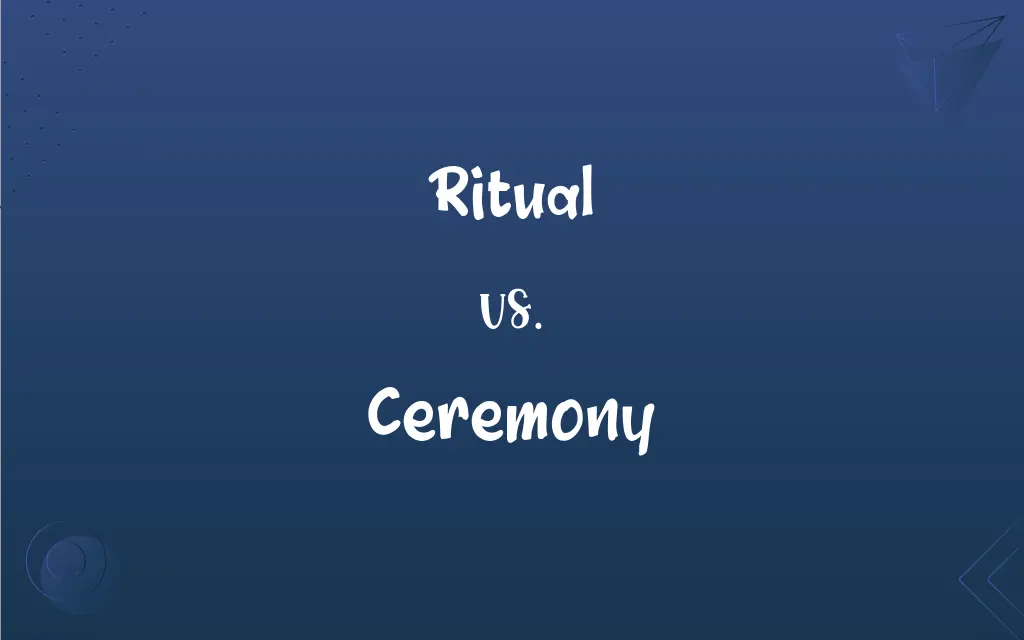Ritual vs. Ceremony: What's the Difference?
By Janet White || Published on December 18, 2023
Ritual refers to a set of fixed actions and sometimes words performed regularly, especially as part of a religious or cultural tradition. A ceremony is a formal event, often celebratory, marking an important occasion.

Key Differences
Rituals are typically repetitive and imbued with deep symbolic meaning, often connected to spirituality or cultural traditions. Ceremonies, however, are more about formal observances and are often public events, marking significant personal or societal milestones.
A ritual is usually a private practice, sometimes secret, often carried out by an individual or a closed community. In contrast, a ceremony is a communal event, involving a gathering of people to witness or participate in the event.
Rituals often involve rites and practices that have been passed down through generations, emphasizing continuity and tradition. Ceremonies, while they can also be traditional, often allow more flexibility and adaptation to contemporary contexts.
In rituals, the focus is more on the act itself and its symbolic value, such as lighting candles in a religious ritual. Ceremonies focus on the event and its significance, like a graduation ceremony, which celebrates academic achievements.
The effectiveness of a ritual is often measured in terms of personal or spiritual fulfillment. For ceremonies, effectiveness is gauged by the successful marking of an occasion or transition, such as a wedding ceremony.
ADVERTISEMENT
Comparison Chart
Nature
Personal, often private
Formal, public
Purpose
Symbolic, spiritual significance
Marking significant events or achievements
Frequency
Often repeated regularly
Usually a one-time or occasional event
Flexibility
Fixed, traditional
More adaptable, can be modernized
Participant Involvement
Individual or closed group involvement
Involves a wider community or audience
ADVERTISEMENT
Ritual and Ceremony Definitions
Ritual
A series of actions or type of behavior regularly followed by someone.
Drinking tea in the evening is his daily ritual.
Ceremony
A formal event held on important social or religious occasions.
Their wedding ceremony was a beautiful and elaborate event.
Ritual
A religious or solemn ceremony consisting of a series of actions performed according to a prescribed order.
The priest performed the ritual of baptism.
Ceremony
An act or series of acts, often traditional, performed at a formal occasion.
The ceremony of raising the national flag is performed on Independence Day.
Ritual
A customarily repeated practice or series of acts.
The ritual of exchanging gifts is central to their family traditions.
Ceremony
A set of formal acts, often fixed and traditional, in a social or religious event.
The award ceremony honored outstanding achievements in science.
Ritual
A prescribed order for performing a ceremonial act, especially one characteristic of a particular religion or church.
The ritual of lighting candles at the altar is significant in many cultures.
Ceremony
A formal occasion to celebrate a particular event or achievement.
The university holds a graduation ceremony every spring.
Ritual
A set of fixed actions performed regularly for their symbolic value.
Her morning yoga and meditation is a cherished ritual.
Ceremony
A ritualistic series of actions performed during a public or social occasion.
The opening ceremony of the Olympics is always a spectacular show.
Ritual
A ceremony in which the actions and wording follow a prescribed form and order.
Ceremony
A formal act or set of acts performed as prescribed by ritual or custom
A wedding ceremony.
The Japanese tea ceremony.
Ritual
The body of ceremonies or rites used in a place of worship or by an organization
According to Catholic ritual.
FAQs
Are rituals always religious?
No, rituals can be secular, focusing on cultural or personal practices.
Is a ritual always a private affair?
Not always; some rituals can be public, though many are private.
Are rituals important in modern society?
Yes, rituals remain important for personal, cultural, or religious reasons.
Can rituals be part of ceremonies?
Yes, ceremonies often include rituals as part of their formal proceedings.
Do ceremonies have to be formal?
Typically, ceremonies are formal, but they can vary in their level of formality.
Are weddings considered ceremonies or rituals?
Weddings are ceremonies, often including various rituals within them.
What defines a ritual?
A ritual is a set of symbolic actions performed regularly, often with spiritual significance.
What is a ceremony?
A ceremony is a formal event, often public, marking a significant occasion.
How do rituals and ceremonies differ in purpose?
Rituals serve symbolic or spiritual purposes, while ceremonies mark important events or achievements.
Can anyone conduct a ceremony?
It depends on the type of ceremony; some require official or recognized figures.
How do rituals affect mental health?
Rituals can provide structure, comfort, and meaning, positively affecting mental health.
Can rituals exist without ceremonies?
Yes, rituals can be standalone practices, not necessarily part of a ceremony.
What are the common elements in ceremonies?
Common elements include formal procedures, speeches, and often a gathering of people.
Can rituals change over time?
While often traditional, rituals can evolve with cultural or personal practices.
What are examples of daily rituals?
Practices like morning exercises or bedtime reading can be daily rituals.
Can ceremonies be non-traditional?
Yes, ceremonies can be adapted to fit contemporary or personal preferences.
How do people prepare for ceremonies?
Preparation can involve planning, rehearsals, and organizing formal aspects.
What makes a ceremony successful?
A ceremony is successful when it effectively marks and honors a specific occasion.
Do ceremonies always involve large gatherings?
Not necessarily; the size of a ceremony can vary depending on its nature.
What role do rituals play in cultural identity?
Rituals are crucial in maintaining and expressing cultural identity and heritage.
About Author
Written by
Janet WhiteJanet White has been an esteemed writer and blogger for Difference Wiki. Holding a Master's degree in Science and Medical Journalism from the prestigious Boston University, she has consistently demonstrated her expertise and passion for her field. When she's not immersed in her work, Janet relishes her time exercising, delving into a good book, and cherishing moments with friends and family.






































































